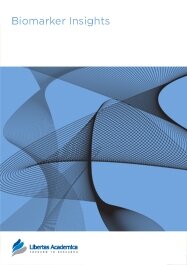

Publication Date: 24 Mar 2011
Type: Original Research
Journal: Biomarker Insights
Citation: Biomarker Insights 2011:6 49-58
doi: 10.4137/BMI.S6347

Background and aim: The current study utilized a carbon tetrachloride (CCl4)-induced liver fibrosis model to measure levels of the MMP9-mediated collagen type III degradation fragment CO3-610 (site of cleavage: KNGETGPQGP), during disease progression and regression, and to investigate a potential prognostic role of the biomarker.
Materials and methods: 72 female Sprague-Dawley rats aged 6 months old were injected with CCl4 twice a week over different periods of time to induce varying degrees of liver fibrosis. After 4, 6 and 8 weeks of treatment, administration of CCl4 was stopped. The 6- and 8-week treatment groups were left to regress for a further 6 or 12 weeks at which point they were sacrificed and livers removed and sectioned. Liver fibrosis was quantified using Visiopharm software to analyse Sirius red-stained sections. Serum levels of CO3-610 were measured in all animals using an ELISA assay as described by Barascuk et al.1
Results: Quantitative histology revealed total collagen deposition in the liver increased as fibrosis progressed. In animals treated with CCl4 for 4 weeks, collagen comprised on average 4.94% of the total tissue in liver sections, while after 6 weeks the mean was 8.25%, and after 8 weeks, 9.11%. During the regression phase, the total collagen deposition gradually decreased to a mean of 6.9% and 5.09% for animals regressing 6 and 12 weeks respectively after 6 weeks treatment, and 6.27% for animals regressed 12 weeks after 8 weeks treatment. CO3-610 values increased progressively in rats treated for 4 weeks (by a mean of 55.0 ng/ml), 6 weeks (mean 61.1 ng/ml) and 8 weeks (mean 70.2 ng/ml). During the regression phase, CO3-610 values rapidly decreased by a mean of 28.9 ng/ml at 6 weeks and 21.6 ng/ml at 12 weeks in animals previously treated for 6 weeks, and by a mean of 19.52 ng/ml in animals treated for 8 weeks and regressed for 12 weeks. CO3-610 levels were statistically significantly correlated with total collagen during disease progression (r = 0.5701, P < 0.0001). No statistically significant correlation was observed during regression (r = 0.2081, P = 0.1138).
Conclusion: Levels of the MMP-9 generated fragment of collagen type III, CO3-610, correlated with the degree of liver fibrosis in rats during the progression phase, but were not correlated with total collagen levels during regression. CO3-610 seems to be produced only under the CCL4 stimulus, and signifies CO3-610 as a potential marker of progression rather than regression. The corresponding steep elevations in levels of CO3-610 total collagen and collagen type III during liver fibrosis progression underline a potential prognostic capacity of the biomarker.
PDF (1.54 MB PDF FORMAT)
RIS citation (ENDNOTE, REFERENCE MANAGER, PROCITE, REFWORKS)
BibTex citation (BIBDESK, LATEX)
XML
PMC HTML


I have had a great experience with submitting my cancer prognosis study to Biomarker Insights. The comments from reviewers and associate editor are high quality and insightful. Congratulations and keep up the good work.

All authors are surveyed after their articles are published. Authors are asked to rate their experience in a variety of areas, and their responses help us to monitor our performance. Presented here are their responses in some key areas. No 'poor' or 'very poor' responses were received; these are represented in the 'other' category.See Our Results
Copyright © 2013 Libertas Academica Ltd (except open access articles and accompanying metadata and supplementary files.)
Facebook Google+ Twitter
Pinterest Tumblr YouTube